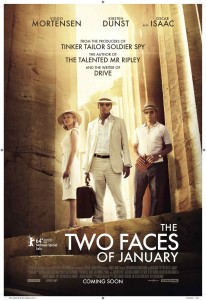Missed Madison: Now Streaming
The Two Faces of January | Hossein Amini | UK/France/USA | 2014 | 96 min
Amazon Instant | Netflix | GoWatchIt | Four Star | Madison Public Library
Despite its pedigree and promise of intrigue, this “Missed Madison” selection disappoints more than it entertains. While it has an enjoyable score and a stylish look, this film is less a thriller and more an exercise in patience.
“Three of them are waiting. Rydal Keener is waiting for something exciting to happen in his grubby little Athens hotel. At forty-odd, Chester MacFarland has been waiting much longer, expecting his life of stock manipulation and fraud to catch up with him. And Colette, Chester’s wife, is waiting for something altogether different.
“After a nasty little incident in the hotel, they all wait together. As the stakes—and the tension—in their three-cornered waiting game mount they learn that while passports and silence can be bought, other things can cost as much as your life.”
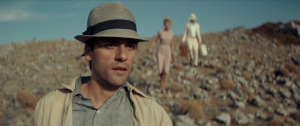 The previous paragraphs are from the back cover of the paperback of Patricia Highsmith’s The Two Faces of January, the novel upon which the movie is based. I start my review with this summary for two reasons: 1) it’s a wonderfully succinct plot description that essentially mirrors the plot of the film, and 2) it focuses on my primary problem with the movie: all…that…waiting—specifically waiting for the film to become something more than it ends up being.
The previous paragraphs are from the back cover of the paperback of Patricia Highsmith’s The Two Faces of January, the novel upon which the movie is based. I start my review with this summary for two reasons: 1) it’s a wonderfully succinct plot description that essentially mirrors the plot of the film, and 2) it focuses on my primary problem with the movie: all…that…waiting—specifically waiting for the film to become something more than it ends up being.
I can’t speak to it as an adaptation, but the film certainly bears some trademarks of Highsmith’s other works: a murder propelling the plot, a young man’s complicated relationship with his father, two men sharing a secret, a woman with conflicted feelings for both men, and the action taking place in exotic locales. With the exception of the exotic locales, none of these qualities are executed as well in this film as they are in other Highsmith adaptations (e.g. Strangers on a Train, The Talented Mr. Ripley).
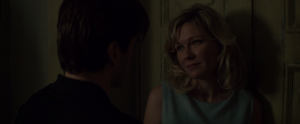 And as with those other cinematic adaptations, we have some very pretty, very talented actors to follow through the course of the story. Alas, they are also quite distant, and unfortunately seem to be trying to imitate other actors more than portraying characters of substantial depth. Viggo Mortensen (as MacFarland) seems to be channeling a more muted George Clooney, while Oscar Isaac (as Rydal) is going for a circa-1972 Al Pacino (i.e. when he opted to smolder instead of scream). As for Kirsten Dunst (as Colette), she has occasional moments where she shines, amidst the rest where I find her character ill-motivated or almost lethargic.
And as with those other cinematic adaptations, we have some very pretty, very talented actors to follow through the course of the story. Alas, they are also quite distant, and unfortunately seem to be trying to imitate other actors more than portraying characters of substantial depth. Viggo Mortensen (as MacFarland) seems to be channeling a more muted George Clooney, while Oscar Isaac (as Rydal) is going for a circa-1972 Al Pacino (i.e. when he opted to smolder instead of scream). As for Kirsten Dunst (as Colette), she has occasional moments where she shines, amidst the rest where I find her character ill-motivated or almost lethargic.
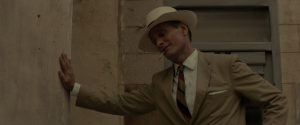 And that’s the thing: there is a lethargy that pervades this film, masquerading as subtlety or ambiguity. It’s a film laden with intrigue that is not at all intriguing. Sure, there’s the relevance of Chester MacFarland, who is a Wall Street bankster-type who has absconded with his clients’ money, which surely resonates with viewers. But the schlubby detective who is after MacFarland (played by character actor David Warshofsky) has more presence and generates more interest than any of the other characters’ disaffected pretensions. This simply should not be the case. (To be fair, schlubby private detectives are always forces to be reckoned with.)
And that’s the thing: there is a lethargy that pervades this film, masquerading as subtlety or ambiguity. It’s a film laden with intrigue that is not at all intriguing. Sure, there’s the relevance of Chester MacFarland, who is a Wall Street bankster-type who has absconded with his clients’ money, which surely resonates with viewers. But the schlubby detective who is after MacFarland (played by character actor David Warshofsky) has more presence and generates more interest than any of the other characters’ disaffected pretensions. This simply should not be the case. (To be fair, schlubby private detectives are always forces to be reckoned with.)

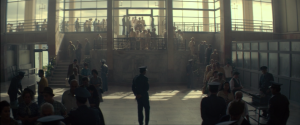 There are several things the film does well. I loved the versatile score by Alberto Iglesias, who also scored several of Pedro Almodóvar’s more recent films as well as the masterful Tinker Tailor Soldier Spy. The score succeeds where the rest of the film fails—in generating suspense. Catchy piano easily transitions to Herrmann-esque strings, and the music fades in and out of scenes in notable and interesting ways. It is also a stylish movie when it comes to fashion and design. While I wouldn’t call its film style distinguished or distinctive, there are many beautiful establishing shots, due mostly to the Greek setting, but also sometimes to the symmetrical nature of certain shot compositions.
There are several things the film does well. I loved the versatile score by Alberto Iglesias, who also scored several of Pedro Almodóvar’s more recent films as well as the masterful Tinker Tailor Soldier Spy. The score succeeds where the rest of the film fails—in generating suspense. Catchy piano easily transitions to Herrmann-esque strings, and the music fades in and out of scenes in notable and interesting ways. It is also a stylish movie when it comes to fashion and design. While I wouldn’t call its film style distinguished or distinctive, there are many beautiful establishing shots, due mostly to the Greek setting, but also sometimes to the symmetrical nature of certain shot compositions.
I’ve liked Hossein Amini’s work as a screenwriter in the past (particularly Drive), but the dearth of intrigue or character depth derails possibilities for real suspense and makes the film, instead, more akin to an exercise in patience. You’ve heard of the “walk-and-talk.” I’d call this film a “smoke-and-stare.” And while I’m disappointed by this, his directorial debut, I find myself curious to see how his next film might improve.
Every now and then, there are mid-tier films that seem to slip through the cracks of Madison exhibition. I am usually frustrated when our “Missed Madison” films pass us by. For The Two Faces of January, however, I was quite content to stream it through Netflix. If you’ve seen the film and want to agree or disagree, we’d love to hear what you have to say in our comments section.
